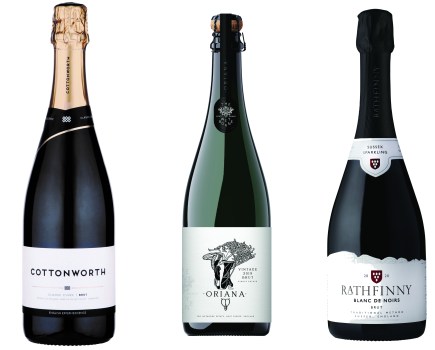Red Johnson, former TV broadcaster and lover of the drinks industry, set up The British Bottle Company in 2014 to assist British drinks brands in developing their export business.
Red Johnson’s company offers market expertise, a network of distributors – and makes the process of export as profitable and pain-free as possible. Over the last five years Red has seen accelerated growth in exports, with increased distribution leading to increased recognition – and his aim for the next five is to maintain that momentum.
The inspiration for The British Bottle Company
I love the drinks industry; its variety, characters and innovation – Britain has led the world in pioneering craft beer, craft gin and the first sparkling wines to seriously challenge the dominance of Champagne. So, in 2014 I set up the British Bottle Company – I assembled a portfolio of brands in the beer and cider, spirits and wine categories and we now work with leading importer and distributor partners around the world. What could be more fun?
Life before the British Bottle Company
My career has been mainly in broadcasting, as a producer and then commissioning programmes for the BBC. I worked on a number of food and drink shows with chefs like Gordon Ramsay and we relaunched MasterChef. Years ago I made a wine show with Tim Atkin which included a feature called ‘What’s in your bag’ where we used to accost customers in Oddbins. An early form of market research I suppose. I’ve always been around the drinks industry; my father is a wine writer, my aunt married into the Fullers brewing family and my grandfather was managing director of Gilbey’s Gin. I’m still looking for a cider maker!
Modus operandi
Our expertise is in matching our supplier partners with the best distributors in the right markets for their drinks. We have travelled many thousands of airmiles developing our network and have a very good understanding of what works in different markets. In addition, we build category momentum in the markets spending time, promoting and educating buyers around the world about our drinks. We have taken groups of winemakers to the USA, Japan and Scandinavia to launch our portfolios and make a statement about English wine, its quality and ambitions. Over the past six years we are very proud of having been instrumental in developing the English wine category around the world.
The importance of exports
Exports currently account for about 10% of English wine sales, in New Zealand the figure is 90%. Exports are key as the category growth is accelerating and business models and investment is dependent on this continued growth. Worldwide recognition also assists in domestic sales and leads to a virtuous circle. With total English wine sales forecast to reach £1bn by 2040 and exports of £350m by the same period, domestic consumption will need to increase to £750m, which is equivalent to the total value of champagne sales today and half of all sparkling wine sales. Either we need to grow export to account for a greater share – or we need to have some very patriotic and thirsty Brits!
Best export markets
English wine does best in sophisticated wine markets with little or no domestic wine industry. Monopoly markets work well such as Scandinavia and Canada where the monopolies are tasked with offering a broad selection of wine to their customers and can ignite a new category. Emerging markets such as China and South Korea are open-minded, anglo-centric and keen to explore new things, so are potentially large markets in the future.
The benefits of exporting with the British Bottle Company
There are three key things that we offer: market expertise, a network of distributors and an ability to make the process of export as pain-free as possible. We also lower the amount of investment necessary by aggregating costs across a range of suppliers for market visits, trade shows and marketing. We take all FX risk and credit risk which is a significant benefit with international trade.
Since our expertise is in export, we are good at the paperwork and procedures. We hold all the relevant licenses to make the process as straightforward as possible. This works both ways as our international partners know that we can overcome the obstacles too.
Who do you represent?
We work with wines that we love, producers that are ambitious and have the ability and desire to scale their exports and with a range of styles and geographies. For instance, when we launched our US portfolio we selected wineries from Sussex, Kent, Hampshire and Cornwall.
We always like to hear from new winemakers that are looking to expand internationally, the key criteria are ambition, scalability, the potential to be good long-term partners, and of course delicious wine.
Top tips for exporting
Make sure you have enough bandwidth in your organisation to support exports, there is always extra work whether its printing new labels for Scandinavia (you have to take all the medals off) or answering questions about production methods to Americans; there is no limit to the geekiness of the American wine lover. You’ll need a consistent tentpole wine or preferably two and you will need to be prepared for your margins to be a lot smaller than the cellar door.
Export growth
The last five years has seen accelerated growth in exports and the challenge for the next five is to maintain that momentum and broaden the spread of markets that have growth potential. For instance, Scandinavia currently accounts for 63% of English wine exports and will soon reach saturation, so the priority is to invest in large markets like the USA. New York is very tough, every winemaker in the world seemingly vying for position. On the other hand, the so-called flyover states are sophisticated wine markets with high disposable income that are largely ignored by international wine brands. I’ve spent time in Texas, Alabama, Kansas, Colorado, Michigan and other states and the level of interest and subsequent demand has been fantastic. It’s these insights that will ensure that momentum is maintained.
We sell both sparking and still wines but the still wines account for only about 20%. I’ve been surprised how quickly some markets have embraced English still wines and this is definitely an area that can assist with growth in the next phase.
Is there an export market for Charmat method wines?
I am excited about innovation, and we already have demand for Charmat style wines but at the moment very limited supply. I recognise that there is concern within the industry about protecting the designation but there is certainly a market for entry level English wines which can assist in creating space for a broader range of styles and most wine producing markets have multiple styles which coexist happily together.
Future challenges?
Projections for sales of English wine in the coming years are very ambitious and finding enough drinkers for all that wine is going to be a challenge. Export markets will continue to grow but it is going to take focus, investment and support from government and other bodies to make it happen. I’ve been banging on about this for ages but why have embassies and consulates around the world not been instructed to serve English wine? I am regularly told it is too difficult but it’s not – this week we are shipping a consignment to our Embassy in Ivory Coast and if we can do that, we can get it anywhere! The Government could do a lot more to help.
British or English?
I have always believed that markets will find their own ways to describe our wines and that’s fine. For instance try getting an American customer not to say ‘British Wine’. Our advantage is having English language labels and being able to adapt these to local requirements as necessary. A standardised simple moniker would help but we’ve done fine without it until now.
Favourite wine?
I always find it difficult to choose a favourite wine, for me wine is about context so my favourite fizz on a sunny day at Henley Regatta will be different to the wine I choose before dinner on a winters evening. The last one I tried was the Hush Heath rosé in a can at the WineGB tasting last week. I am a big fan of innovation and I think what they’ve done with a new method and new packaging is very interesting.
Spare time?
We live on the Solent shore so I’m mostly to be found messing about on boats!




